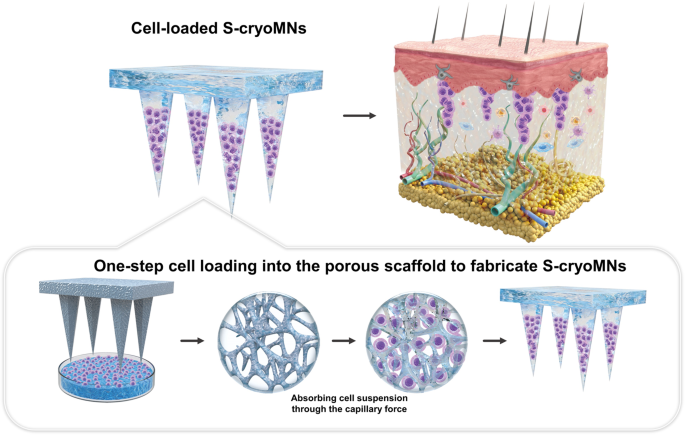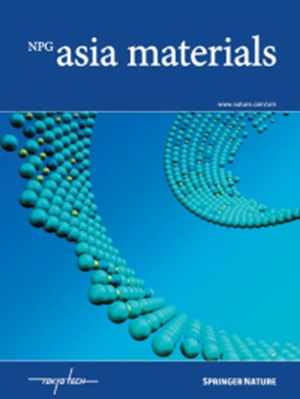In situ-formed cryomicroneedles for intradermal cell delivery
IF 8.3
2区 材料科学
Q1 MATERIALS SCIENCE, MULTIDISCIPLINARY
引用次数: 0
Abstract
Cryomicroneedles (cryoMNs) offer a convenient and minimally invasive way to precisely deliver therapeutic cells intradermally for treating local and systemic diseases. cryoMNs are manufactured by shaping and freezing the cell-containing cryogenic media in a microneedle template, which allows cells to be packaged in advance for direct usage in the clinic. However, the current cryoMNs require cold-chain transportation and storage and do not permit the loading of autologous cells in situ. This article introduces the second generation of cryoMNs (S-cryoMNs) that address these limitations. Specifically, S-cryoMNs are made by dipping a porous MN scaffold in the cell suspension before cryopreservation. The porous scaffold can be transported at room temperature, and researchers can load any cells with the optimized cryogenic medium. As a proof-of-concept, we examined the loading and intradermal delivery of three cell types in clinically relevant in vitro and in vivo models, including mesenchymal stem cells for wound healing, melanocytes for vitiligo treatment, and antigen-pulsed dendritic cells for cancer vaccination. This research presents a novel way to transport healing cells to the skin using a tool known as a cryomicroneedle. The scientists created a sponge-like microneedle (tiny needle) that can carry cells by immersing it in a cell suspension (liquid containing cells). This technique enables easy storage and movement of the microneedles, and the cells can be added on-site for immediate application or kept for future use. They tested this technique with three cell types related to wound healing, vitiligo (a skin condition that causes loss of skin color) treatment, and cancer vaccination. The findings revealed that the cryomicroneedles could effectively transport the cells to the skin and trigger the intended healing effects. This innovative method could potentially enhance the efficiency and convenience of cell treatments. This summary was initially drafted using artificial intelligence, then revised and fact-checked by the author. Cryomicroneedles (cryoMNs) permit the precise delivery of therapeutic cells into the skin, but are limited by the cold-chain transportation and storage. This article introduces an innovative solution to use a prefabricated porous microneedle scaffold that can be shipped at room temperature and allow on-site cell loading and usage in the clinic (i.e., the second generation cryoMNs or S-cryoMNs). The study investigates the loading and intradermal delivery of three cell types in clinically relevant in vitro and in vivo models, including mesenchymal stem cells for wound healing, melanocytes for vitiligo treatment, and antigen-pulsed dendritic cells for cancer vaccination.


用于皮内细胞递送的原位成型冷冻毛细血管针
低温微针(cryoMNs)提供了一种方便、微创的方式,可在皮内精确输送治疗细胞,用于治疗局部和全身性疾病。低温微针是通过将含有细胞的低温培养基塑形并冷冻在微针模板中制成的,这样就可以提前将细胞打包,直接用于临床。然而,目前的低温微针需要冷链运输和储存,无法在原位装入自体细胞。本文介绍的第二代低温凝固蛋白(S-cryoMNs)可解决这些局限性。具体来说,S-cryoMNs 是在低温保存前将多孔 MN 支架浸入细胞悬液中制成的。多孔支架可在室温下运输,研究人员可以用优化的低温介质装载任何细胞。作为概念验证,我们在临床相关的体外和体内模型中检验了三种细胞类型的装载和皮内递送,包括用于伤口愈合的间充质干细胞、用于白癜风治疗的黑色素细胞以及用于癌症疫苗接种的抗原刺激树突状细胞。
本文章由计算机程序翻译,如有差异,请以英文原文为准。
求助全文
约1分钟内获得全文
求助全文
来源期刊

Npg Asia Materials
MATERIALS SCIENCE, MULTIDISCIPLINARY-
CiteScore
15.40
自引率
1.00%
发文量
87
审稿时长
2 months
期刊介绍:
NPG Asia Materials is an open access, international journal that publishes peer-reviewed review and primary research articles in the field of materials sciences. The journal has a global outlook and reach, with a base in the Asia-Pacific region to reflect the significant and growing output of materials research from this area. The target audience for NPG Asia Materials is scientists and researchers involved in materials research, covering a wide range of disciplines including physical and chemical sciences, biotechnology, and nanotechnology. The journal particularly welcomes high-quality articles from rapidly advancing areas that bridge the gap between materials science and engineering, as well as the classical disciplines of physics, chemistry, and biology. NPG Asia Materials is abstracted/indexed in Journal Citation Reports/Science Edition Web of Knowledge, Google Scholar, Chemical Abstract Services, Scopus, Ulrichsweb (ProQuest), and Scirus.
 求助内容:
求助内容: 应助结果提醒方式:
应助结果提醒方式:


